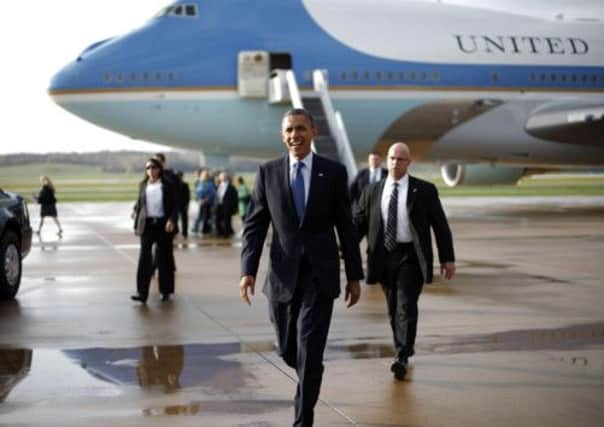Ted Bromund: Obama travels in style but fails to reach the right conclusions


Obama’s just back from Africa. Technically it’s his second; he made a brief stop-over in Ghana in 2009. This visit was more substantial, as it covered Senegal, South Africa, and Tanzania. But it hardly shows a remarkable commitment to Africa. After all, Xi Jinping, China’s new president, has already visited three African nations, even though he only took office in March.
The Chinese, of course, have an actual plan for their relations with Africa: sign bilateral agreements that give Chinese firms access to African raw materials. The US, by contrast, is mostly concerned with appearances.
Advertisement
Hide AdAdvertisement
Hide AdThe President’s big announcement in Africa was a plan to give more money to the US Export-Import Bank, which in turn will use the money to help African nations buy from US companies.
Supposedly this will help bring electricity to rural Africa. But if the development projects are profitable, they should find support in the private sector. If they’re not, the US taxpayer will take the loss. The only sure winners are the US firms that will get the orders, which is why US conservatives regard the bank as a classic example of crony corporate capitalism.
But as they say, it’s only money.
Obama’s visit to Germany to speak at the Brandenburg Gate was a more costly failure, even if it didn’t involve the US subsidising anyone to buy American.
The speech was supposed to echo other famous Presidential appearances in Berlin, including Kennedy’s and Reagan’s, though predictably Obama failed to tip his hat to the Gipper’s “tear down this wall” challenge.
Advertisement
Hide AdAdvertisement
Hide AdThere were certainly lots of echoes during his speech: the tiny audience Obama drew was a long way away from the cheering throngs he met when he spoke in Berlin in 2008. Like Africans, Europeans have moved towards a measure of realism about the President.
The blunt reality is that Obama isn’t much interested in either Africa or Europe, and though he may be a European in ideological terms, that’s not what the Europeans care about. They don’t just want Obama to agree with them: they want to feel that they matter.
But under the European Union’s leadership, Europe has done nothing but grow slowly, produce financial crises and cut defence spending. In spite of his natural affinity for the EU and the praise he unwisely heaps on it at every opportunity, even Obama can’t pretend that Europe is a rising power.
So this time in Berlin, Obama did what he most likes to do: talk about himself. Specifically, he focused on his desire to make further cuts in the US’s nuclear stockpile.
Advertisement
Hide AdAdvertisement
Hide AdThis may be the one aspect of US foreign policy about which he is truly passionate. His policies in Iraq and Afghanistan can be summed up in one word: quit. But he devotes a lot more than one word to nuclear weapons.
A pity that his words aren’t better chosen. Ever since his Prague Speech in 2009, where he first proclaimed his anti-nuclear gospel, North Korea and Iran have been running as fast as they can the other way. Russia has embarked on a programme of nuclear modernisation, and there are disconcerting rumblings of nuclear interest from American allies as diverse as Japan and Saudi Arabia.
That just goes to show that the US nuclear umbrella serves many purposes: for one, it gives allies who live in dangerous neighbourhoods a reason not to go nuclear themselves. The weaker the US looks, the more our allies feel the need to reinsure, and a nuclear programme is a powerful piece of reinsurance.
The President is blind to this reality: to him, the problem is the US and Russian nuclear stockpiles.
Advertisement
Hide AdAdvertisement
Hide AdIncredibly, his answer to the problem of Iran and North Korea was to proclaim the need for a “new international framework for peaceful nuclear power”, as if that is really what these dictator nations want.
But in 10 years, both of these trips will pale in significance compared to the long-brewing failure of Obama’s 2009 visit to Egypt. This is the biggest foreign folly a US president has committed since President George HW Bush went to Ukraine and warned its parliament not to break up the Soviet Union.
In 2009, Obama’s emphasis was on apologising for the United States, in the false hope that by proclaiming everyone’s moral equivalence, the Middle East’s intractable problems could be resolved. That left him unwilling to support protests against the US’s declared enemies, such as Iran. Obama was, though, all too willing to back revolutions against autocrats in Tunisia, Libya, and Egypt.
We shouldn’t ignore the ugliness of the Mubarak security state. But foreign policy often offers a choice only between a greater and a lesser evil. And the result of Obama’s policy has been to put the US in the position of trying to prove our good faith by supporting the rule of the Muslim Brotherhood in Egypt.
Advertisement
Hide AdAdvertisement
Hide AdThat is a fool’s errand if ever there was one. Unsurprisingly, after the latest coup, we’re now plumbing new depths of unpopularity in Egypt.
No one now trusts the US – certainly not the Brotherhood, which was born to hate us, but also not the Army, and not the tiny band of genuine Egyptian liberals either.
It’s a long way from the “New Beginning” that Obama touted in 2009. Time and again, Obama has travelled abroad, only to see the hope he raises dashed by the consequences of his own actions.
He’s not going to get rid of nuclear weapons, win the goodwill of the Brotherhood, or electrify Africa. Obama’s travels always bring promises, but unwise promises are the mark of a feckless foreign policy.